- Home
- Priscilla Royal
Chambers of Death Page 3
Chambers of Death Read online
Page 3
Silence fell between them as the widow returned to her examination of the feverish girl.
As long as the unexpected arrival of extra company did not add problems to a household suffering enough from illness or death, Eleanor decided she had no need to learn exactly why Mistress Maud was here. Turning her concern back to the immediate crisis, she asked: “Will you be able to find all that Mariota needs here? The weather is too foul to travel abroad for anything.”
“Master Stevyn’s wife always had a fine herbal garden and cared for many of the servants herself with successful concoctions. I will seek out anyone to whom she may have taught her secrets, for no manor is without its healer. Perhaps there is some new and potent remedy for me to learn.” Maud’s expression brightened.
“It was kind of Master Stevyn to grant us a haven,” Eleanor commented as they turned away from Mariota’s bed.
“The steward is away, his return delayed by this storm, but his wife will be pleased to learn that it was done as he would have wished.”
Now completely confused, Eleanor shook her head. “Did you not just say his wife had died?” She eased herself back down on the stool near the fire and braced her back against the stone wall.
“Ah, forgive me! Of course you could not know all this, and I am a poor one for explaining anything. Master Stevyn has since taken another wife, one of many fewer years than he possesses. She is the reason you find me here, for young women often need advice on marital issues from their elders, and her mother is long dead.”
The prioress frowned in bewilderment. What did this woman mean? Pregnancy? The marriage debt? Surely all this would make more sense after she had slept a few hours.
“When your man arrived at the gate,” Maud continued, apparently interpreting Eleanor’s expression to mean displeasure at the failure of the steward’s wife to greet her, “Mistress Luce had taken to her bed. Had she not done so, she would have met you at the door but will most certainly make proper amends when she rises in the morning. I shall explain that it is her husband’s custom to give shelter as Our Lord demanded. She will not quarrel with the decision to do as her husband would have wished.”
Eleanor nodded. None of this was her concern as guest in this house, and normally she would have cast undue inquisitiveness from her mind. But fatigue had dulled her watchfulness over idle curiosity, and Maud’s words raised an odd question. How young and untutored was this wife that she would need direction in common courtesy? Then her eyes began to burn, and she rubbed them until they watered just enough to ease the rawness.
“My lady, shall I have your pack horses unloaded in the morning?”
Eleanor’s head grew so heavy, she knew she was quickly losing her battle with fatigue.
“My lady?” The widow’s voice was gentle.
The prioress snapped awake. “In the morning, if you would be so kind,” she replied. “I fear we may have to beg the steward’s hospitality until Mariota’s illness takes some turn. She cannot travel. The distance to our priory is too great even with a wagon and fair weather, an unlikely enough occurrence in this dark season.”
“Master Stevyn will not expect you to leave until you wish to do so. The only recompense he might beg would be your prayers. He is a good man. Overall.”
That brief hesitation was not lost on Eleanor, but weariness blunted her interest in further reflection.
“I must seek out cures, my lady, but the search will not take me long.” Maud folded her hands in humble supplication. “After I return, I would be honored if you’d allow me to take first watch over this young woman tonight.”
The widow read her weakness well enough, Eleanor thought, and had handled the problem with courtesy. “Thank you,” she managed to say, just before her eyelids shut.
Chapter Five
Mistress Luce knew the way well enough without a torch. Dread of taking a misstep on the uneven, muddy ground was not the reason her heart pounded so, but fear she most certainly felt and it excited her.
Although she wore a heavy cloak, the wind stung her face and hands. In just a few moments, she’d be warmed enough, she thought, then bit back a laugh.
And what would her husband do if he came home tonight? Pull off his reeking boots, stumble into bed stinking of horse, and fall asleep, mouth open and drool soon running from his lips. “A loving greeting indeed for his young wife,” she muttered. “And if I were elsewhere than his bed, he wouldn’t even notice.”
But her husband would not be back. His loins weren’t hungry enough for her to brave the dangerous roads. He’d rather find some inn, drink enough to fall asleep in the flea-infested straw, and probably dream of how much cattle he’d have to slaughter to get through the winter.
She snorted. He had ridden her often enough at the beginning of their marriage. Following the first nights, when she still hurt after her maidenhead was torn, she discovered a taste for coupling. Even though he had rough hands, body hair as bristly as a boar’s, and his belly sagged over his manhood, she tolerated this old man. He was her husband after all. When he pulled her legs apart, she shut her eyes and imagined a smooth-skinned, taut-muscled youth mounting her. Thus she found pleasure.
Then his ardor faded. And she had not conceived.
Luce shuddered, but the wind was not the cause. How often had she played the harlot to force her husband’s mind from the dull business of estate management to bedding a wife? And how rarely had it worked?
When her humors turned sluggish and black, a young midwife told her that she suffered from congestion in her womb, a common affliction of women without husbands. The woman’s treatment gave her relief enough, but Luce still lacked a babe.
As she approached the low building, she saw the light flickering in the cracks between the wooden slats. The narrow door opened.
“You’re late,” he complained.
“And you are the better man for it,” she teased, running her hand lightly down his tight belly to his swollen sex.
As he pulled her inside and shut the door, she caught herself thinking that her prudent husband should be grateful. He no longer had to pay the midwife for her treatments, and she might well give him a boy—one disinclined to monkish ways, like his other two sons, because this lad would be bred in good, hot lust.
Chapter Six
“No tasting ‘til it’s done!” The red-faced cook raised her wooden spoon with exaggerated ferocity as if threatening to strike, but her broad grin belied any such intent.
Folding his hands most prayerfully, Brother Thomas bowed. “But the aroma already tempts. Even a saint would weaken, and I am only a sinful mortal.”
“’Tis but a simple pottage of winter roots, Brother. Nothing that a monk of your high rank would find pleasing.”
“Rank, Mistress? In God’s kingdom, there is no greater title than servant, and I am honored to bear nothing else on earth.”
“Fa! I have been in my lord’s service for enough years and cooked for men who have spoken to the king himself. Your speech does not belong to any man of common birth.” Turning her broad back to him, she resumed stirring the soup in the iron cauldron, which was attached to a sturdy but adjustable pot hook over the fire. The contents bubbled with hearty vigor.
Thomas’ nose twitched at the piquant scent. “You are wrong! The smell from that pot is so ennobling that it would free a villein and raise a king to sainthood!” He might have broken his fast an hour before, but his mouth was truly watering. “What spices do you use? The nuns in our priory kitchen would add your name to their daily prayer if you would share the secret.”
The cook laughed with joy like a young girl and was about to reply when a woman’s voice, brittle with disapproval, rang out.
“You spend too much time in idle chatter, Hilda. Last night, supper was cold and late. Get back to work!” The source of the complaint stood at the kitchen entrance, rigid as a stick, arms tightly folded across her breasts.
The cook turned away an
d gripped the wooden spoon with both hands. Her sole response was to flush a far darker red than the heat of the kitchen might justify.
Thomas studied the angular, sallow-faced woman in the doorway. His instant impression of her was not favorable. “I beg pardon, Mistress, and ask that you blame me alone if there has been any failure worthy of rebuke.”
Her tiny eyes narrowed as they swept over the monk from tonsure to foot and back again, but somewhere in between her expression softened. “I am Mistress Constance. My husband is the eldest son of Master Stevyn, steward to Henry de Lacy of high rank and renown.” She began to lick her lips. “And who are you?”
Thomas wondered if he had somehow been transformed into a sizzling chunk of roasted venison.
A young man slipped quietly out of the shadows behind her and bent to her ear. “The monk is no wandering mendicant, Mistress.”
Startled, the heir’s wife yelped, her thin arms flailing wildly as she lost her balance.
The man laughed but quickly caught her before she fell. “He is Brother Thomas, and his prioress occupies the earl’s chambers.”
Shaking herself free of his grasp, she hissed at the young man. Although her exact words were incomprehensible, they were uttered with the vehemence of a curse.
“As I heard the tale, the late meal was your fault. Had you not been fluttering around Prioress Eleanor like some oversized moth, instead of getting her to a warm fire, she might have been less chilled and you might have had the supper when it was still hot.”
Her look hard as granite and her yellowish complexion reddening to a dark orange, Mistress Constance grimaced as if she had just smelled sulfur from Hell. Then she directed a more honeyed gaze at Thomas. “Oh,” she murmured, “it is your prioress who has sought shelter with us?”
“That is true.”
“God has answered my prayers twice over! This house of sin has long needed a cleansing presence.” She shot a malevolent glance at the young man behind her. “And now the evil has increased enough to require the intercession of more than one virtuous soul to save us.”
With exaggerated caution, the young man eased his way around Ranulf’s wife.
She drew back, flattening her back against the door frame as if the mere touch of his robe would defile her virtue.
“There is some bread and a piece of cheese over there, Master Huet.” The cook pointed to the table at the far end of the kitchen. Confirming that Mistress Constance could not see her do so, she winked broadly at him.
“Beware, Brother, for my elder brother’s beloved spouse weighs every mortal on her own scale of holiness. Prioress Eleanor’s reputation has proven her to be most worthy, but you may have to spend many hours enduring her scrutiny before she deems you equal in respect.
“I honor my betters, something you might learn to do yourself,” Constance barked.
Huet glanced heavenward and tore off some fresh bread, which he began to munch with unmistakable contentment.
“And my husband shall hear of your impertinence to me,” Constance spat. “As for you, Hilda, attend your duties or you may find we no longer need your poor service.” With that, she spun around and marched back to the manor house.
Huet dropped the bread and stretched his hand out to the cook. “I did not mean to cause trouble,” he said, his voice soft with concern.
With a smile akin to that of an adoring mother, Hilda shook her head. “She’s threatened to push me out the gate almost daily since she married your brother. Hasn’t yet done so, as you can see.” She turned to Thomas with a sheepish look. “I suffer from sinful pride, Brother, and believe there are few who do as well at my task with as much of an eye to cost. Master Stevyn and his first wife were kind enough to say so, and their guests often expressed satisfaction with the meals.”
“Pride is sinful only when it exceeds merit,” Thomas replied. “I would say that soup proves you are innocent of any excess.”
The young man laughed. “If you be a priest, Brother, you must take my confession. Methinks any penance you’d require would be as gentle as your speech.”
“And I would guess that you have some experience of priests?” Thomas replied, gazing with pointed interest at the man’s head.
Huet instinctively stretched a hand over a slight indentation in his hair and flushed in silence.
The cook sat down on the bench and clutched the young man’s arm with protective affection. “Whatever has happened, I cannot think he is at fault. A mischief, he might be, but he’s a good lad at heart,” she protested.
“I did not mean to suggest otherwise.”
“The good monk knows no one in this place, Hilda.” The man patted her hand. “There is no need to defend before any accusation has been made.”
Jerking her head toward the kitchen door, the cook frowned. “Your sister-in-law suggested enough, lad, and others might also speak harshly of you with just as little cause. Softer words in a stranger’s ear first are never amiss.”
“Nor are honest ones.” Huet turned back to the monk, all merriment dismissed from his expression. “In truth, I took no final vows, Brother. The tonsure has nearly grown out, and a falcon would be jealous of your keen eyes in noticing it.”
“As guest in this manor, I have no cause to pry. That would be poor thanks for charitable hospitality.” Thomas reached his hand out in peace.
Huet took it.
Thomas concluded he could do worse than to respect the cook’s good opinion of the steward’s younger son.
Content that the monk had no wish to condemn her favored lad, Hilda pushed herself from the table. “Then I must find enough chickens for the evening meal, lest Mistress Constance complain next that I am starving the master’s guests.” With that, she departed to seek some aged hens.
“Will you share this with me, Brother?” Huet gestured at what was left of the round loaf. “There is ale as well, and that cheese is dry enough to cry out for some.”
Thomas nodded and cheerfully sat down with the man.
“You honor courtesy by asking no questions, Brother, but I must confide my whole story to my father in due course. Until then, I confess a wicked but delightful pleasure in telling my sister-in-law nothing.” Huet poured the amber liquid into two pottery cups and passed one to the monk. “Despite her oft-repeated abhorrence of any hint of sin, Mistress Constance would take a knife to my soul if she thought she could learn the reasons for my return. In fact, my sins are dull enough, but she is convinced they are so loathsome that I have seen her salivate while imagining the horror.”
Thomas grinned.
“I should not accuse my elder brother’s wife of hypocrisy, for I do believe she honestly fears Hell, but I have oft wondered if she protests the evil in others just a bit too eagerly.” He cut into the cheese wheel and dug out a crumbly orange chunk to offer the monk.
“Does your brother share this eagerness?”
“Ranulf reminds me of our dead mother in his ardent faith, although she chose to follow Our Lord’s more charitable commands. As his example, my brother took the desert fathers. Like them, he roars against sin.”
“I am surprised he did not wish to enter a monastery.”
Huet chuckled. “Ranulf suffers from lust, Brother. He was wise enough to know he must marry for he is incapable of celibacy.”
Remembering the look Mistress Constance gave him, Thomas hoped the wife pleased Ranulf more in the marital bed than the husband obviously satisfied his wife. “I grieve that they have found so little peace in God’s love,” he replied gently.
“And you show more charity than I ever have, Brother. Yet, for all his faults, my brother is kin to whom I owe a dutiful love. Ever since their marriage, however, he has grown more rigid in his ways, a change that I blame on her influence.” He shrugged. “Did you look closely at her beady eyes? I have seen rats with a sweeter gaze. Whenever I meet her, I am transformed into a hunting cat and feel compelled to bat at her like prey.” He
bent his fingers into claws and swatted at a piece of bread.
“I heard that!” Hilda marched in from the courtyard and tossed her chosen fowl to a young girl for plucking and gutting. “Be careful, lad, or your father will take you to task for tormenting her,” she said, glancing over her shoulder as she picked up a heavy knife.
“I doubt he’ll pay me much mind, except to demand I prove myself no wastrel despite the abandonment of my studies. My father has enough to worry him with his new wife.” Huet bit his lip as if he had not meant to say the last aloud, especially in a stranger’s hearing.
Although his curiosity was pricked, Thomas pretended to have heard nothing of interest.
“I’ll not make ill comment about Mistress Luce,” the cook snorted, then looked down at one naked bird just placed on the table. She picked it up and tossed it back to the girl. “There are still pin feathers on this! Did I not teach you to singe them? Are you asleep?”
Comparing the woman’s words to her tone, Thomas decided Hilda had been quite artful in expressing an unfavorable opinion of her mistress without the danger of condemnation.
“But your sire has a right to an explanation,” the cook continued, and to add emphasis, she cracked through the joint of a chicken thighbone with a mighty thwack.
“Aye, but I confess I have yet to find the words.”
“Talk to Mistress Maud, then. She’s come to help the mistress and always did have a weakness for you despite your wicked tricks. She’ll find a way for you to soften up the master.”
“Our good cook thinks me awfully bad,” Huet whispered loudly to Thomas.
“Only when he was a boy and would slip into the kitchen to steal bites of my pastry.”
For just a moment, Thomas saw a little boy reflected in the man’s eyes.
“I thought she’d blame the mice,” Huet said.
The cook put her hands on her hips and glared at Huet with mock anger. “Mice have tiny teeth. I know a boy’s mark from that of any rodent!”
Thomas roared with laughter. “I tried that myself as a boy and failed as well!”

 The Twice-Hanged Man
The Twice-Hanged Man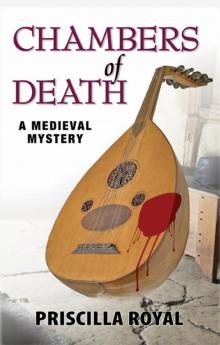 Chambers of Death mm-6
Chambers of Death mm-6 Forsaken Soul
Forsaken Soul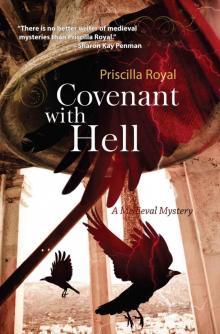 Covenant With Hell (Medieval Mysteries)
Covenant With Hell (Medieval Mysteries)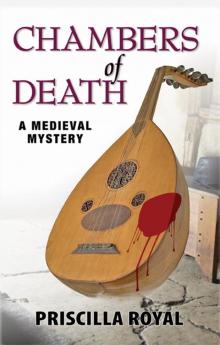 Chambers of Death
Chambers of Death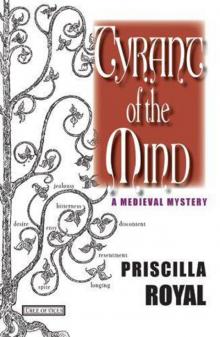 Tyrant of the Mind
Tyrant of the Mind Wild Justice
Wild Justice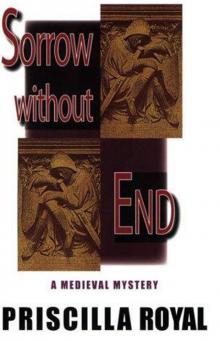 Sorrow Without End
Sorrow Without End Wine of Violence
Wine of Violence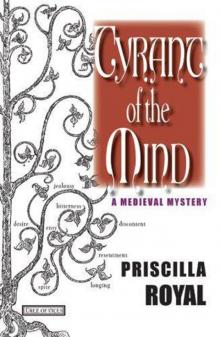 Tyrant of the Mind mm-2
Tyrant of the Mind mm-2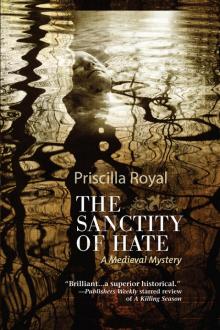 The Sanctity of Hate
The Sanctity of Hate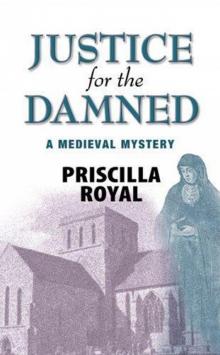 Justice for the Damned
Justice for the Damned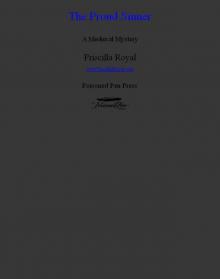 The Proud Sinner
The Proud Sinner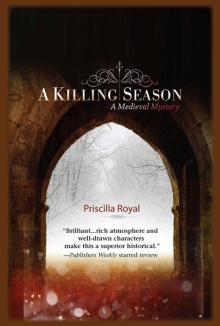 A Killing Season mm-8
A Killing Season mm-8 Forsaken Soul mm-5
Forsaken Soul mm-5 Valley of Dry Bones mm-7
Valley of Dry Bones mm-7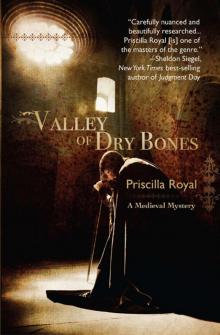 Valley of Dry Bones
Valley of Dry Bones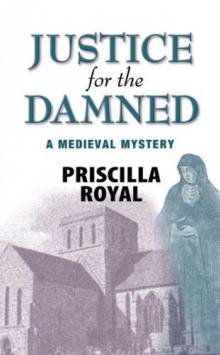 Justice for the Damned mm-4
Justice for the Damned mm-4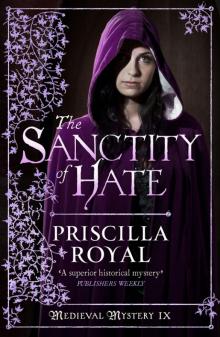 Sanctity of Hate
Sanctity of Hate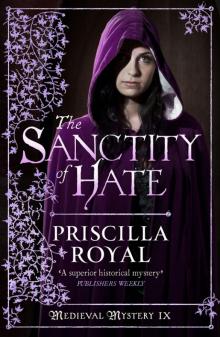 Sanctity of Hate mm-9
Sanctity of Hate mm-9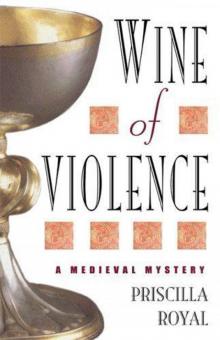 Wine of Violence mm-1
Wine of Violence mm-1